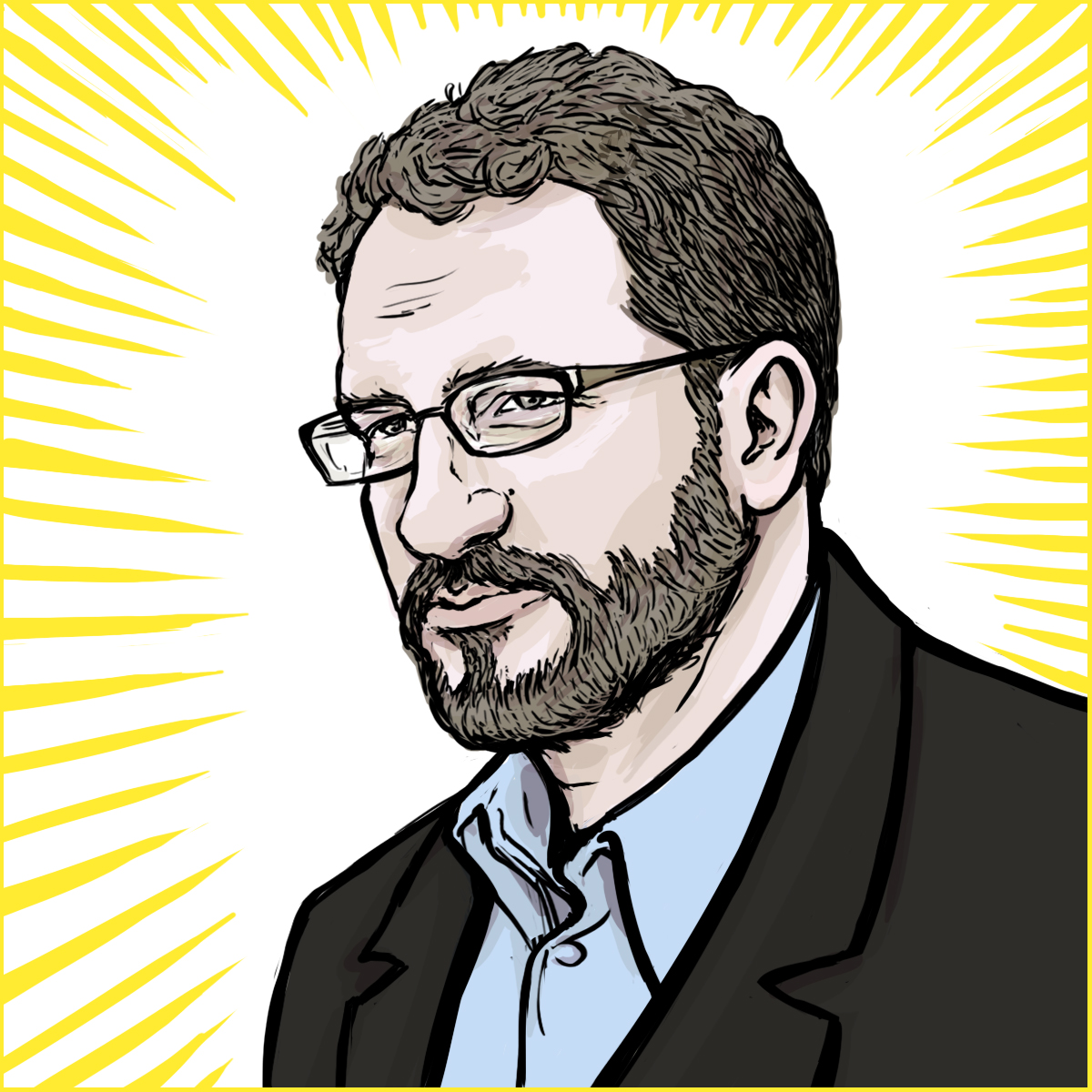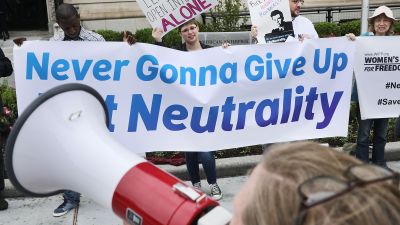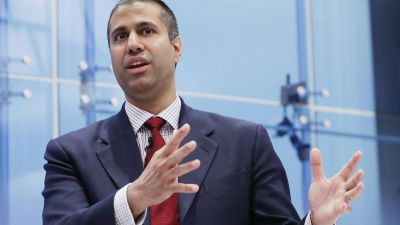
(Illustration by Christa Cassano)
Craig Aaron took what he learned about freedom of the press at journalism school and built a career and movement around it — embodied in the organization Free Press. He’s championing First Amendment issues for the digital age. He’s fighting for net neutrality and an end to cable companies’ attempts to gain a monopoly over the free flow of online information.
The election of Donald Trump posed innumerable challenges to Aaron’s work with Free Press. “Anything we’ve been able to accomplish over the last decade or so is completely under attack,” he said. “We have been pushed into a more reactive state than we would like, because we’ve had to play defense — whether it’s these megamergers, attacks on net neutrality, attacks on privacy, attacks on media ownership rules, attacks on the press itself. All of that has been happening simultaneously.”
In recent years, as the internet has increasingly become the place where Americans work and live, Trump’s assault on net neutrality and free speech has coincided with growing awareness among Americans about the role the internet now plays in democracy. Aaron has seen interest rise in the causes that Free Press champions. He sees the country as positioned at a crossroads. What keeps him up at night, he says, is where “misinformation meets monopoly.” He’s doing what he can to fight both.
This interview has been edited and condensed for clarity.
BillMoyers.com: The FCC votes next Thursday, Dec. 14, on whether to gut new neutrality. According to polls, the majority of Americans support net neutrality. FCC Commissioner Jessica Rosenworcel wrote an op-ed in the Los Angeles Times asking people to “make a ruckus.” What specifically should people do?
Craig Aaron: The first thing you should do is call your senators and representative in Congress. They have oversight on the FCC and can put pressure on Chairman Ajit Pai to stop this vote. The number is (202) 224-3121. Or go to BattleForTheNet.com and we’ll help connect you directly to the right folks.
More than 750,000 calls have gone to Capitol Hill since the Tuesday before Thanksgiving when the rules were announced, and they are running about 4,000 to 1 against Pai and the Trump FCC, though I’m not sure they’ve gotten any calls in favor that weren’t from lobbyists. This pressure is especially important because this fight will come back to Congress, and we don’t want them accepting any fake compromises or pushing Comcast-written bills that pretend to be for net neutrality. They need to be reminded — constantly and repeatedly — about how much their constituents care about the open internet.
After you do that, it’s not a bad idea to also call the FCC and tell Pai and the two other Republican commissioners how much you dislike what they’re doing. You don’t have to choose just one target. There’s enough outrage out there for all of them.
If you want to do more, you can sign up to be part of the volunteer organizing corps we call Team Internet. Thousands of people are already working together online. We’ve borrowed strategies from places like the Bernie Sanders campaign to use tools like Slack and Relay texting to coordinate efforts, reach other activists and let people know where events are happening and ways they can take action.
One of the main things Team Internet is working on right now is helping to support more than 600 protests that are being organized against the FCC nationwide on Dec. 7. Many of these are taking place outside Verizon stores. Pai used to be a Verizon lawyer, and sometimes it seems like he still works there. You can find the one nearest you by going to VerizonProtests.com — and if there’s not one near you yet, you can volunteer to organize your own. It’s easy and we will help you.
We’re also planning a big rally with our partners in the Voices for Internet Freedom Coalition — which campaigns for digital civil rights — outside the FCC on Dec. 14. So if you’re on the East Coast, come on down.
— Craig Aaron, Free Press
We need to make a lot of noise in the next two weeks. So raise your voice, use your social media, tell your friends. Commissioner Rosenworcel is right: Now is the time to raise hell.
You’ve told us before that it’s going to be really hard for Pai’s FCC to get rid of net neutrality. Why is that?
Aaron: A lot of reasons. Some of them are sort of on the technical side. There’s a strong public record on the issue, and the fact is that the Obama FCC, under a lot of pressure — they actually had to be forced to do this — passed really strong rules, and those rules have been upheld by the federal courts. So they re-established the FCC’s authority under the law.
The industry tried to challenge them, and they’ve lost. So that’s the record that’s on the books. It’s not enough for the Trump FCC to come in and say, “Hey, new administration, new rules.” They actually have to build a legal case with evidence for overturning these rules.
We’ve seen Ajit Pai’s proposal, and it doesn’t do that. It’s filled with shoddy legal reasoning and ignores all the economic evidence of net neutrality’s impact — and it’s clear that investment is up, deployment is up, all the telecom companies are crowing to their investors about the new services they are rolling out. But then the FCC wants to pretend the opposite is happening and ignore the record on anything that points out these flaws.
Pai may be ideologically motivated and determined to kill net neutrality, but he hasn’t actually made the legal case for doing so — and that will matter in court.
Does anyone read the public comments?
Aaron: Well, the best answer I can give you is they’re supposed to, but unfortunately Ajit Pai doesn’t seem to care what the public thinks. His order barely makes mention of the 22 million comments the agency received. People should be really mad about how he’s treating the comments. But don’t think your comments don’t matter — because they will matter in establishing the legal record that Pai is ignoring the public he is supposed to serve.
Pai can’t even be bothered to address the clear evidence of fraud in the docket. Many comments — maybe millions — were filed using people’s personal information without their permission. Some appear to be coming from bots. When a journalist who covers tech policy found his identity stolen and used to argue against net neutrality in the docket, Pai wouldn’t do anything. Even when the attorney general of New York launched an investigation, the FCC refused to cooperate.
What role will these fake comments play in the FCC’s decision?
Aaron: When whoever was spamming the docket got caught filing anti-net neutrality comments, they started filing pro-net neutrality ones, too. That means Pai and the telecom lobbyists can claim that the whole system is broken and can’t be trusted. Instead of addressing the fraud, they use it as an excuse for inaction. It’s scandalous.
Next they try to invalidate the efforts of groups that use petitions as a tool to organize. But it’s not the same thing: We know exactly how many petitions we put in and when we did it. We are eager to take credit for them and those filings represent people who went out of their way to weigh in on a once-obscure issue like net neutrality. What you need to worry about is the comments that no one is taking responsibility for. That’s what deserves suspicion. And it certainly wouldn’t be the first time a powerful industry group tried to game a public process.
In the end, here is what matters: There have been more public comments filed on net neutrality than on any other federal issue — ever. And 99 percent of the unique comments support real net neutrality and the strong FCC authority on the books. None of them support Ajit Pai.
— Craig Aaron, Free Press
If the FCC kills net neutrality, what happens next?
Aaron: If Pai doesn’t heed the public outcry, it will only grow louder.
The first thing we are going to do is sue him. This order is the textbook definition of what the lawyers call “arbitrary and capricious” — and we believe we have a strong case that will lead the federal courts to throw out these rules. That’s the next big fight.
At the same time, pressure will mount on the Congress to throw out these rules. And it should. But we need to be careful not to fall for AT&T’s trick and allow legislation that’s 5 percent less awful than what Pai is peddling to be passed off as a compromise.
With unlimited resources arrayed against you, do you think you’ll still be fighting these fights like net neutrality and media cosolidation in 10 years?
Aaron: I think they will evolve and change. I don’t think we can ever stop fighting in some ways, but I’m seeing huge progress and the debates have changed. And the media has changed so dramatically. Yes, we are still fighting local-media consolidation and we’ve filed very detailed objections, and we think it’s going to be really bad for local communities for Sinclair to get these stations. And there’s a whole new set of bigger players.
I don’t think we fully know what this political moment is yet. I don’t think we’re going to look back at the Trump regime as a high point in the country’s history, absolutely not. But I’m still really interested in what comes from the backlash, what comes next, and what opportunities open up. There’s a lot of conversation about corporate power, about media power — like how the media created Donald Trump and if there’s a reckoning coming from that.
Suddenly you find yourself playing defense on smaller fights that you thought you had already won. But it’s also a moment like being in the wilderness, where all the power is lined up on the other side, and you actually can think about bigger things, like what does it mean to break up these companies, what does it mean to get serious about anti-trust, what do we do about the growing power of Facebook, Google and Amazon? Suddenly, these are questions that I think people are more willing to wrestle with.
Let’s talk about Sinclair Broadcast Group’s proposed merger with Tribune. What’s the state of play there?
Aaron: If it’s allowed to go through, it would give them control of more than 230 television stations all across the country, reaching 72 percent of the country, which is interesting because there’s a federal law that says one company can only own television stations reaching 39 percent of the country. But Sinclair has convinced the Trump FCC to essentially change the rules to make it appear under the law like they own far fewer stations. It’s a huge deal, and there’s no indication that the Trump FCC is interested in doing anything but fast-tracking it.
To make it even worse, I think there’s more to come. Sinclair is leading a push to get rid of bunch of the existing regulations, including limits on how many television stations one company can own in a given market, a longstanding ban on newspapers and broadcasters in the same market being owned by the same company, and some other regulations. And I suspect they’ll go to Congress to try to get that national cap changed.
So we can see a lot of movement coming, and when you listen to Sinclair talk to their investors, not only do they not make any attempt to pretend they’re smaller than they are, of course, they’re selling how big they are. They’re saying they imagine a world where there would only be one or two dominant companies in a given market and maybe only three to five broadcasters in the entire country. That’s their vision for where local TV is going, which is not very local.
These rules they’re trying to get rid of — how did they come about and what’s their importance?
Aaron: We have to remember that these are the public airwaves and these licenses were handed out decades ago in exchange for broadcasters actually providing public service and serving local communities. For most people, the No. 1 source for local news is still their local television station. These rules were put in place to ensure that on the local level you’d actually have competition and competing viewpoints — you couldn’t have one company owning all the broadcast outlets in a given community. Companies like Sinclair have been railing against these rules for years and coming up with all kinds of ways to evade them.
So will this be the moment when they can get rid of the rules?
Aaron: I think it’s pretty bad, but maybe unsurprisingly, this administration has been really sloppy in how it has carried out its policies. So whether it’s this media ownership approach or their attack on the free and open internet, they aren’t necessarily doing so in legally sustainable ways.




